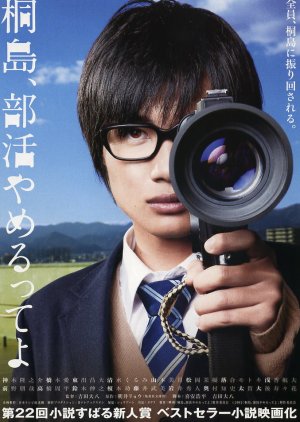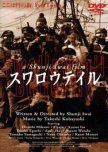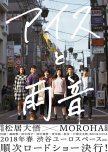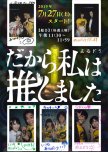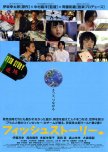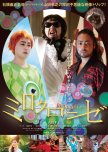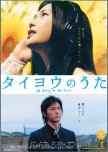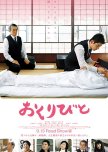
I see why this movie is rated so badly in international fandom. Fans and even critics alike ripped this drama apart for its very unorthodox approach to the story and characters. And it IS really different to other shows at the same traits. Well, the makers of the movie actually took risky path anyone has refused to do, while it can be done in more mainstream way but it didn't. Yet, it appears to be very successful in terms of technical merit and the fact it won prestigious awards proves that this show is actually irrefutably good.
If you had watched Vantage Point or any kinda shows like that, you will easily notice that both shows do a number of point of views. In Kirishima Bukatsu Yameteruyo, they are a movie geek, a girl who can't make her mind, Kirishima's best friend, timid girl, bitchy girl, etc. The title-mentioned Kirishima itself disappears and practically never shows up. It is the aforementioned characters with their own point of views who are affected and exhibit subsequent changes due to the disappearance. Yes the plot is actually pretty straight without shocking twists, but if you watch in-depth, down to the character's gestures, you'll find revelations after revelations that even if they do not give you a very clear picture of the ending, you will know what would happen next.
It should be noted that the character developments are the main point of this movie and they are handled in masterful manner. I personally think the directing is a masterclass and so is the acting. What makes me surprised is, aside of some well-known former child actors like Kamiki and Suzuka Ohgo as well as acting prodigy Ai Hashimoto, most of the casts are no-name young actors, some even just begin their acting careers. The acting level in the movie is so even but very good, not a single actor displays stark stand-out or being weak spot. If I could name a single actor who plays the best, perhaps it's Higashide (the big guy) and I surprised because this lad is already 24-25 years old at the time of the filming and he plays an 18 years old boy. Not only for that, he plays Hiroki who is Kirishima's best friend (hence he is the most influenced one) with depth and heart. This lad, as the rest of the young casts, has a very bright future in acting world.
BTW, the song played with the ending credit is incredible and passionate, as well as fits the movie very well. The back sound during the "brawl" is also deserves thumbs up.
This shows may not be for everyone and even I have to watch it 2 times to research the details and depth. But it's worth trying and watching and I declare this one as one of my all-time favorite.
Was this review helpful to you?

The story is not an outstanding one, without any action scene and a plot-twist. It is a brilliant coming-of-age movie and shows perfectly which impact the disappearance of a guy, named Kirishima, on people has, directly and implicitly. The character development was the center of the movie .
I like the cast , these are the most talented young actors I've seen over the last years, especially Kimiki Ryunosuke and Higashide Masahiro. These two stood out. Kimiki Ryunosuke did such an outstanding performance.
Higashide Masahiro did a wonderful job too. His character Hiroki was for me the personification of the movie, he had the biggest development, and the way how Masahiro portrayed this was distinguished . These two young actors have a bright future..
But the rest of the cast was awesome too.
I think it is the best cast in a high-school movie.
The music. I loved the music, the combination of classic music and "alternative"-music was just great. The credit-song "The Sun also Rises" by Takahashi Yu, is very beautiful and the musical interpretation of the movie,
It's not a movie which you can't watch it a second time because you will know what will happen.I think you have to watch the movie many times , it will help you to understand the meaning of the movie and you will discover every time something new .
Overall this movie is just a masterpiece in the Japanese movie industry. Many people don't like it, because it is a bit hard to understand and not everybody's favorite kind of movie.
Although the movie was put in a high school-setting, I think this movie is about life, about the changes in your life and what it means to grow up. Even if you're a adult you can relate to this. If you're having a hard time, this movie is a great help.
And another topic is the social hierarchy in school which is easily found in our society too.
Another reason why I love the movie was the ending scene , when everybody was on the roof. The ending was just awesome and one of the greatest scene I've ever seen.
Great cinematography, screenplay and editing. And the director was brilliant.
A True Masterpiece.
Was this review helpful to you?

The Kirishmia Thing is a film that I can definitely recommend.
The Kirishima Thing is at its strongest when portraying how the order and structure of Japanese society impacts the high school. The uniform clad students endure long days of arriving pre-sunrise to departing in the dark of night. The sports teams practice and play on both Saturday and Sunday determined to earn honour and recognition for their school. There is great respect for one’s elders as the students bow to their teachers when greeting and departing. Director Daihachi Yoshida astutely highlights how tradition still plays an important role even in the insular version of society that high school creates.Yoshida constructs a film that is both visually appealing and very well written. The opening sequence, titled Friday, is shot from four different perspectives which helps to emphasize how each group interprets their place in the hierarchy. This allows Yoshida to use different camera angles, framing and even alter the content to accentuate the current perspective of a particular scene. Yoshida manages the drama by evoking a sense of a contained atmosphere. Many of the school arrivals are shot from above to make the school feel small and overcrowded.
The Kirishima Thing is a superior presentation of high school life that takes a different path from typical conventions. The characters move in and out of the preconceived notions that one would normally associate with their roles. As a result, Yoshida captures the structure of Japanese school life in a robust and enjoyable way. The Kirishmia Thing is a film that I can definitely recommend.
Was this review helpful to you?

This movie is one of the most genuine portrayals of high school life in Japan
The Kirishima Things looks a bit simple on first glance, there's a sharp and poignant little film hiding behind its inconspicuous facade.Yoshida is know to balance his work between comedy and drama, but his true signature is the cheeky, somewhat darker sense of humor that can be found in each of his films. Not always in the same quantities or with the same vibrance, but it's always there, lurking and waiting to leap out at the audience. Even though The Kirishima Thing's dramatic impact clearly outweighs the comedy, fans of Yoshida's work are sure to flash a couple of devious smirks while watching.
One of the smaller details that had me amused early on, is the chapter approach Yoshida took to work his way through the story. While he opted to split the narrative in classic days-of-the-week divisions, the first four segments are in fact alternate takes on the same event, all aptly titled "Friday". Not very functional, I admit, but definitely worthy of a respectful smile. There are several similarly fun details and/or moments, but it's really up to the audience to filter them out. Should you miss them though, no need to worry because the film is easily able to survive on its dramatic strengths alone.
The story revolves around Kirishima, a model student of a local high school. With a volleyball final and university selections coming up, Kirishima shuts down completely and disappears from public view. Nobody knows what exactly happened, but he isn't responding to anyone, not even his best friend and his girlfriend can get through to him anymore. Without a clear role model, the class scrambles to get through one of the most critical moments of their year, at the same time the disappearance of Kirishima prompts several of his classmates to crawl out from under of his shadow.
Yoshida's visual style may not be all that flashy or in your face, but it is ultracrisp. Tight camera work, strong contrasts and bold color tones (mostly blues, but the film doesn't look cool or dreary in the least) all help to make the visuals pop. In broader lines it isn't all that different other Japanese dramas, but where those tend to go for a softer and dreamier vibe, Yoshida isn't afraid to keep it clean and potent. Bottom line: the films looks beautiful.
The soundtrack is mostly notable in its absence. There are maybe two or three scenes where additional music was added to the film and one sequence where a brass band rehearsal is mixed into the main narrative, building up to a rather impressive climax. The rest of the soundtrack is just ambient noises, though often set up in such a way that they do create some sort of practical rhythm. It shows that Yoshida is very much aware of the power of sound, but is restrained enough to use it only when he feels it would add something to his film.
Acting Wise there's nothing to complain about either. Equal parts deeply affecting and funny, with Ryunosuke Kamiki's (Ryoya Maeda) performance mostly supplying the latter. His comic timing and movements moved the audience at the Japanese embassy's annual film festival here in the Philippines to tears (from laughter, that is). The stereotypes are only mild and understated and none of the characters are too introverted, so even audiences used to Western films should have an easy time getting through to the characters.
What's most interesting about The Kirishima Thing is that its main character is never really there. Apart from the introduction (where we see him a couple of times from the back - though without the context of the rest of the film you won't even realize), Kirishima is entirely absent. Even so, his presence is felt in every scene. Don't expect to learn anything about him either, as the film is more interested in examining the effect Kirishima's absence has on his classmates. The themes here are pretty universal and recognizable, except that the focus on the Japanese school system and its fascination with school clubs might still alienate some people.
While Yoshida has quite a few stories to tell and quite a few angles to explore, the film still feels like a very tight package, sporting little to no cruft. The Kirishima Thing is not a spectacular film, but Yoshida's direction is so deliberate and steadfast that it sucks you right in from the start. It's beautifully shot, aptly scored and well acted and it gets extra bonus points for its Tetsuo hommage. An easy recommend for Yoshida fans, but I feel pretty confident the film could also appeal to a wider audience.
Was this review helpful to you?

